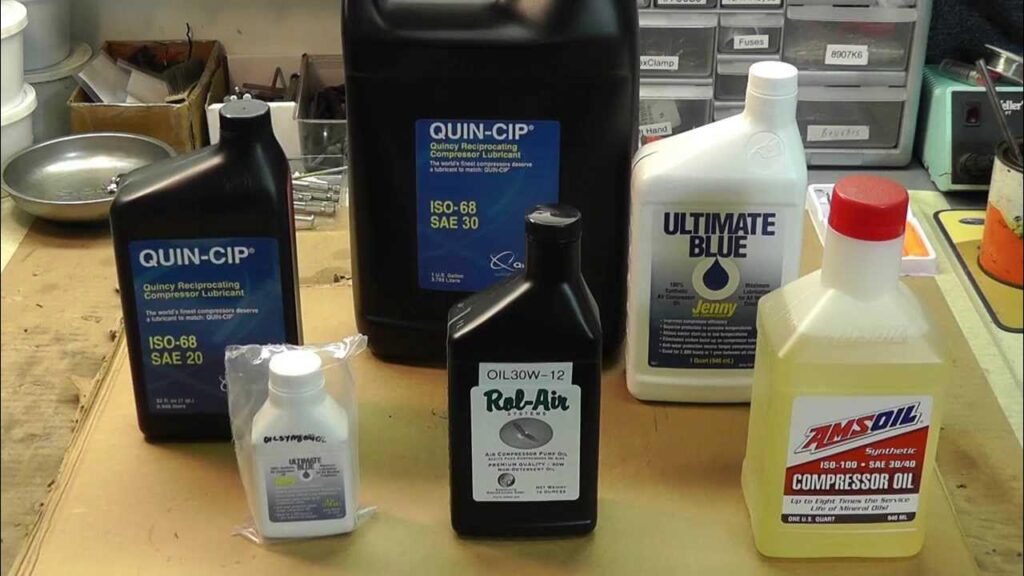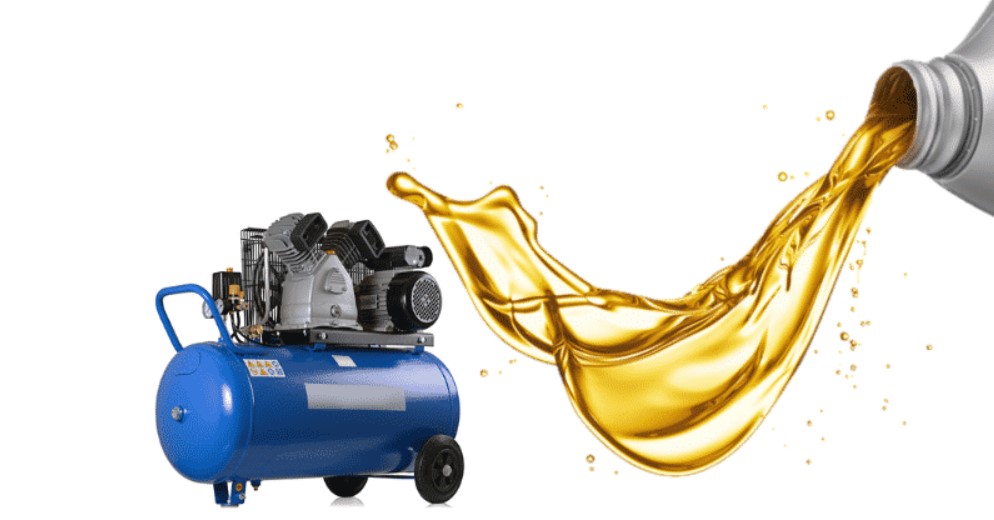One frequently asked query is whether 5W30 oil or motor oil can be used in air compressors. No, that’s the resounding response. High pressures and elevated temperatures that air compressors produce are beyond the capabilities of engine oil and 5W30 oil.
The components of the compressor may be harmed by using these lubricants, which could also result in decreased performance and efficiency.
Compressors are crucial parts in a variety of commercial and industrial applications, from power tools and machinery to supplying clean, compressed air for numerous processes.
It is essential to lubricate the moving parts of the compressor with the right oil to maintain the best productivity and lifespan.
Choosing the right air compressor oil for your air compressor is crucial. The appropriate oil can help your compressor run more efficiently, avoid downtime, and last longer.
Failure of the compressor, additional maintenance, and decreased effectiveness can result from using the incorrect oil.
This essay will discuss the numerous air compressor oils on the market and the significance of choosing the proper one.

Contents
- 1 Which Oil Can You Use in an Air Compressor Without Risk?
- 2 Composition of mineral oil
- 3 Is it possible to use 10w30 in my air compressor?
- 4 Is it safe to use motor oil in an air compressor?
- 5 Considerations for Selecting the Type of Air Compressor Pump Oil
- 6 Learn More About the Alternatives to Air Compressor Oil
- 7 The reason why rotary screw air compressors require oil
- 8 How often do you have to change the oil compressor
- 9 FAQ
- 10 Conclusion
Which Oil Can You Use in an Air Compressor Without Risk?
Compressor oils come in two varieties: synthetic and mineral-based. Mineral-based oils are widely employed and economical. Air compressor oil is perfect for compressors that aren’t used continually because they can withstand mild temperatures.
Mineral-based oils offer optimal solubility in CFC, HCFC, and blended refrigerants and are manufactured from excellent base stocks. Mineral-Oil-Based Refrigeration Compressor Lubricant has a very long service life and remarkable chemical and thermal stability.
Compared to synthetic air compressor oil, mineral oil is more flammable and more likely to evaporate.
On the other hand, synthetic oils are entirely synthetic, non-detergent oil made specifically for reciprocating compressors. To lessen varnish and valve carbon deposits that could impair compressor life, synthetic base oils resist oxidation.
Its superior additive package guards against wear and corrosion. They are designed to deliver improved performance and durability in difficult circumstances.
Although these high-performance lubricants are more expensive, they are the best choice for compressors that run continuously or in hot settings.
Composition of mineral oil
Petroleum is used to make mineral motor oil. Crude petroleum goes through several refinement procedures to get rid of as many contaminants as it can after being extracted and sent to a refinery.
Although mostly made up of hydrocarbons (oxygenated or not), this air compressor oil may also contain concentrations of other substances like sulfur or nitrogen. The so-called mineral motor oil is processed and then given additives to enhance performance.

Is it possible to use 10w30 in my air compressor?
Depending on the manufacturer’s recommendations and the compressor’s intended application, 10W-30 oil may be used in an air compressor.
It is essential to adhere to the manufacturer’s instructions to guarantee optimum performance, avoid compressor damage, and increase the compressor’s lifespan.
To ascertain the proper oil viscosity and type needed for the particular air compressor model, check the owner’s manual or the manufacturer’s website. While some compressors may need a synthetic blend or entirely synthetic oil, others may only need non-detergent oil.
If you are in a hurry, you can use one of the motor oils given that they are non-detergent, synthetic oil.
Improper lube and cooling of the compressor’s components can lead to lower performance, increased wear and tear, and potentially irreversible harm to the compressor. One example of this is using 10W-30 motor compressor oil in a compressor that needs a different type of oil.
Hence, it is advised that you always use the air compressor oil that the manufacturer suggests. It is advisable to get counsel from the manufacturer directly if you are unclear or can’t find the owner’s manual.
Is it safe to use motor oil in an air compressor?
Although you may theoretically run an air compressor on motor oil, motor oil often contains detergents that will create carbon build-up inside a compressor unit. Instead, oil producers have developed oil, especially for compressors that don’t contain detergents.

Considerations for Selecting the Type of Air Compressor Pump Oil
There are some things to take into account when selecting an air compressor pump oil type, including:
Viscosity
How efficiently an oil can lubricate a pump depends on oil viscosity.
The thickness and flow ability of the oil is determined by its viscosity. The viscosity of the oil has to be compatible with the range of temperatures that the compressor operates, and consideration should also be given to the oil’s viscosity index (VI) rating, as higher VI ratings signify greater performance throughout a wider range of temperatures.
Additives
Certain oils may include additives like corrosion inhibitors, anti-wear agents, and detergents. These additives can help the oil operate better while safeguarding the compressor pump from harm. The individual needs of the pump should be taken into consideration when choosing oil additives.
Compatibility
When choosing an oil type for an air pump, compatibility is crucial.
Ensuring the oil is suitable with the compressor’s seals and other parts is crucial.
The pump can sustain damage and lose the manufacturer’s warranty if the incorrect type of oil is used.
Oil’s life
The oil’s lifespan is a vital factor to take into account because it has an impact on the compressor’s maintenance needs and overall operating costs. Mineral oils often last less time and need to be changed less frequently than synthetic lubricants.
Hence, in the long run, synthetic oils might be a more economical option.
Environmental
Environmental elements including humidity, temperature, and air quality can have an impact on how well the oil performs. When choosing an oil that can survive the conditions under which the compressor runs, it is essential to take these aspects into account.
For instance, high temperatures can hasten the breakdown of oil, while high humidity levels can cause water to contaminate the oil.

Learn More About the Alternatives to Air Compressor Oil
Alternative oils that can be used in place of standard air compressor oils are known as air compressor oil substitutes. When the suggested oil is unavailable, or when changing the oil is necessary for an emergency, these alternatives can be utilized.
It is significant to remember that while certain alternatives might be appropriate to be applied to compressors, others should be avoided since they could harm the pump.
The market offers a variety of alternatives to air compressor oil, including synthetic oils, motor oils, hydraulic oils, and ATF (automatic transmission fluid). Each of these oils has distinct qualities and traits that make them appropriate for particular uses.
Motor oil
For instance, motor oil is frequently used in place of air compressor oil in an internal combustion engine. It is not advised to utilize in air compressors, however, as they are not made to sustain high operating temperatures.
In these circumstances, motor oil can degrade quickly and harm the pump.
Motor oils come in handy when lubricating internal combustion engines such as car engines.
Hydraulic oil
Another oil that is occasionally used in place of air compressor oil is hydraulic oil. While hydraulic oil might be appropriate for some applications, hydraulic oil is not suggested for use in air compressors since it can harm the compressor pump’s seals and other parts.
Hydraulic oils are a great option for automatic transmission fluid, as the name implies.
ATF
ATF is frequently used in place of air compressor oil. ATF is a premium oil that is appropriate for use in air compressors since it can tolerate extreme heat and pressure. It is crucial to remember that not all ATF varieties can be used in air compressors. Just the recommended ATF type should be utilized, and it ought to be changed according to schedule.
Synthetic oils
Traditional air compressor lubricant can be replaced with synthetic compressor oil. Compared to conventional mineral oil, synthetic oil is made to perform better and last longer.
Synthetic oil is appropriate for use in compressors since synthetic oil can tolerate high temperatures and pressures. Yet, synthetic oil can be more expensive than conventional oil.
The reason why rotary screw air compressors require oil
Oil is required by rotary screw air compressors to lubricate the compressor pump’s working parts and preserve the system’s effectiveness.
Rotary screw compressors need oil to make sure that the internal parts function properly, as opposed to oil-free compressors, which depend on specifically created coatings and materials to prevent friction.
These are some explanations for why screw compressors require air compressor oils:
Lubrication: To reduce friction and wear, the internal rotors, bearings, and gears of a rotary screw pump must be greased. Air compressor oils create a thin coating between the moving parts, decreasing wear and friction and extending the compressor pump’s lifespan.
Cooling: By absorbing heat produced during operation, the oil also aids in cooling the pump. This lessens the possibility of internal component damage and helps keep the compressor from overheating.
Sealing: The oil also aids in sealing the compressor pump’s interior parts, reducing air leaks and maintaining the system’s effectiveness. The oil aids in forming a barrier between the rotors and other internal parts, slowing the escape of compressed air and lowering the power needed to run the compressor.
Cleaning: The oil also aids in clearing out pollutants and debris that may be amassing in the pump. The impurities are carried by the oil to the oil filter, which eliminates them from the system and aids in preserving the compressor pump’s effectiveness.
How often do you have to change the oil compressor
The kind, manufacturer’s recommendations, and operating circumstances are only a few of the variables that affect how often the oil needs to be changed in compressors and internal combustion engines.
Compared to screw compressors, reciprocating compressors need more regular oil changes, and older engines and reciprocating air compressors frequently utilize non-detergent oils.
For optimum performance, it is crucial to keep the oil level at the proper level, change the oil frequently, and replace the oil filters.
It is essential to choose the proper oil-lubricated air compressors, and it is best to abide by the manufacturer’s recommendations regarding oil type and viscosity.

FAQ
Can I use engine oil in an air compressor?
Using this oil in an air compressor is not advised. The unique requirements of an air compressor are not catered to in this oil formulation.
Motor oils contain chemicals and detergents that are intended to protect internal engine parts from wear and deposits, but since compressor parts operate at much greater temperatures and pressures than internal engine parts do, these compounds might not be sufficient to preserve them.
Furthermore, this oil could not have the lubricating and cooling qualities needed for an air compressor, which could lead to a reduction in efficiency and a rise in operating temperatures.
It is preferable to use compressor oil that was created specifically for air compressors that meet the needs of your compressor.
What kind of oil can I use in my air compressor?
Depending on the particular needs of your air compressor, you need to use a certain type of oil in it. The appropriate oil type and viscosity should be found in the owner’s manual for your compressor.
Most air compressors need a non-detergent motor oil that is made solely for compressor operation.
These lubricants are made to offer excellent lubrication and cooling capabilities for the compressor’s internal workings while also preventing the accumulation of impurities and residues that could harm the compressor’s performance and limit its lifespan.
There are also synthetic compressor oils that are made to have even better lubricating and cooling qualities than mineral oils. Moreover, they are more oxidation and breakdown resistant, which can result in longer service intervals and longer compressor life.
It is crucial to remember that using the incorrect oil or an oil that is not designed specifically for air compressors can lead to decreased efficiency, higher operating temperatures, and early wear and component failure.
As a result, it’s crucial to use the oil type and viscosity that the manufacturer suggests for your particular compressor.
Can I use 30 weight motor oil in my air compressor?
In your air compressor, you can use 30 weight motor oil, yes. Air compressor manufacturers advise using 30-weight synthetic lubricants in warm settings because they provide additional protection during the summer, according to numerous sources, including Your Garage Guide.
An air compressor can also be used with non-detergent motor oil. It’s essential to use the right oil so that your compressor runs smoothly and quickly.
However, using non-detergent motor oil that has the same viscosity and weight as your typical compressor oil is advised.
In general, it’s not a good idea to use 30 weight motor oil in your air compressor.
Although 30 weight motor oil can seem like a good alternative to compressor oil, it might not offer the lubricating and cooling qualities essential for an air compressor to operate properly.
Conclusion
It is paramount to choose the right oil for your air compressor; this cannot be emphasized enough. Motor oil and 5W30 oil are inappropriate for use in air compressors and can cause serious harm. While synthetic oils are best for high-temperature and high-load applications, mineral-based compressor oils are the most widely used and economical choice.
A decent rule of thumb is suggested to be taken into consideration by most compressor manufacturers for figuring out each of a given lubricant’s effects. It implies considering how long it takes to heat and then cool the lubricant, how much oxidation is induced by the heat, and how much it can withstand cold temperatures.
The right compressor lubricating oil can help your compressor run more efficiently, avoid downtime, and last longer. For this reason, it’s crucial to follow the manufacturer’s instructions when selecting the proper compressor oil for your air compressor and before flushing the oil tank.
Learn More: Can I Use 5W30 in My Air Compressor?


